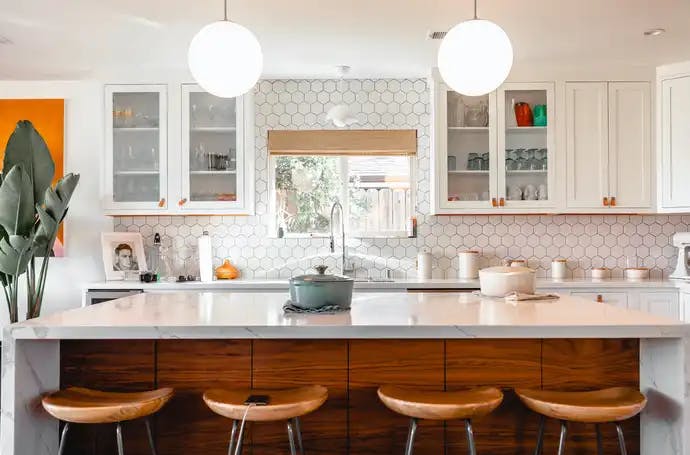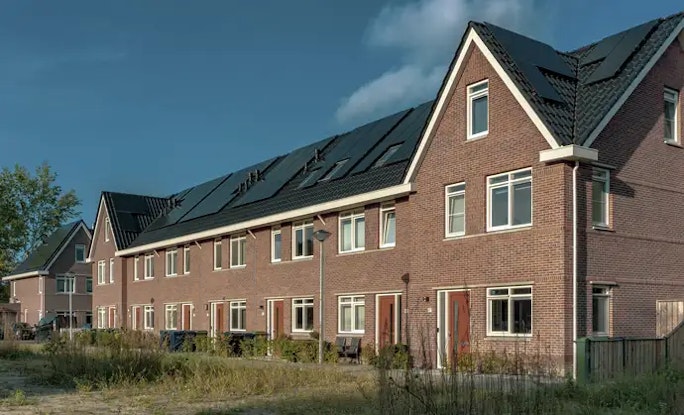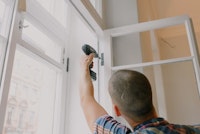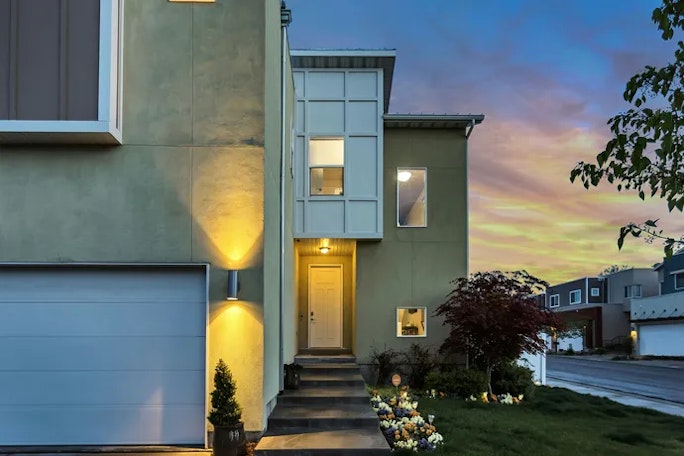Table of contents
Are you considering buying a house without a mortgage? Good for you! There are several advantages to buying a property with your own money, but there are also a few disadvantages you should be aware of. In this article, we will go through the pros and cons with you. And we'll tell you what to consider when buying a house without a mortgage.
Buying a house without a mortgage with your own money, is it possible?
These days, you hear it more and more: buying a house without a mortgage, with your own money. Whether it is possible for you to purchase a property without a mortgage depends entirely on your personal situation. Do you have a substantial equity, inherited money, or a lot of savings? Then it may certainly be possible to pay the entire purchase price or part of it without a mortgage.
Think carefully about how much of your own money you are investing in the purchase of your new place. When buying a house, you usually have more to deal with than just paying the purchase price. Most houses are sold with buyer's costs. In that case, you will incur additional costs such as transfer tax and notary fees. You naturally want to have enough money left over for that.
If you buy a property freehold, these costs for buying a house are already included in the purchase price. But you may still incur other costs, such as the fee for a real estate agent.
Also consider unexpected circumstances and future plans. Are you planning a nice trip, is your car due for replacement soon, do you want to refurbish your home or buy new furniture? Then make sure you have enough money left over, so you don't run into problems. You definitely want to be able to continue living comfortably.
Are you looking for a new house? Then you are at the right place. Receive proposals from real estate agents directly and choose the best real estate agent for the purchase of your new home.
Find a purchasing agent- Independent
- Non-binding
- Free
- Quick

The pros and cons of buying a house with your own money
Buying a home fully financed with your own money has various implications for your savings, monthly expenses, tax return, and notary fees. Below, we list the various advantages and disadvantages for you.
Advantage 1: low monthly expenses and no closing costs
If you take out a mortgage for the purchase of your new home, you pay closing costs. These include advisory and brokerage fees, notary fees, appraisal fees, and fees for the mortgage deed. To repay your mortgage debt, you pay interest monthly to the mortgage lender.
If you buy a house with your own money, you don't encounter this. You pay no closing costs and enjoy lower monthly expenses. This gives you a great deal of financial freedom and the opportunity to spend your salary on other things.
Advantage 2: Wealth tax
Another advantage of buying a house without a mortgage is the potential reduction of the wealth tax. Wealth tax is the tax levied on your assets, including your savings and investments. In 2023, you pay this tax on assets from an amount of €57,000.
If you use your equity or savings to buy a house without a mortgage, this amount is no longer in your account. You therefore don't have to pay wealth tax on it.
Advantage 3: Imputed rental value
The Tax Authorities see your home as a form of income. If you are a homeowner, you will therefore have to deal with the imputed rental value when filing your income tax return. This is a percentage of the WOZ value of your house that you must add as an amount to your income (if the purchased property is your main residence).
But: if you have bought a house without a mortgage, then your mortgage interest is lower than your imputed rental value. You are then entitled to a ‘deduction for no home debt’. You therefore pay less imputed rental value. This is a third advantage of buying a house without a mortgage.
Do you want to know how this applies to you? Contact a financial advisor and/or consult the Tax Authorities website.

In addition to several advantages, there are also a few disadvantages to buying a house without a mortgage. You can read below what these are.
Disadvantage 1: Tax advantages
The first disadvantage is the loss of tax advantages and deductions associated with having a mortgage.
If you do have a mortgage, you can in many cases deduct the paid mortgage interest from your taxable income. This allows you to benefit from good tax advantages, as your taxable income is lower. If you don't take out a mortgage, you miss out on this deduction for your income tax.
Additionally, all costs you incur for taking out a mortgage are one-time deductible from income tax. Think of costs for mortgage advice, appraisal fees, and notary fees. This also provides a nice tax benefit. Logically, you do not benefit from this tax advantage if you purchase your house with your own money.
Disadvantage 2: Financial buffer
To purchase a house without a mortgage, you need to have sufficient own money to pay the full purchase price of the house, as well as any additional costs such as notary fees and transfer tax. You will therefore have to give up a large part of your financial buffer.
Having a financial buffer is important to cover unexpected expenses, such as repairs, medical costs, or loss of income. It is your safety net during tough economic times. Additionally, it is harder to terminate the purchase agreement when you buy the house with your own financial means.
Talk to a financial advisor about the possibilities regarding buying a house without a mortgage. Discuss your situation and wishes and find out whether you are wise to do so or if you should better (partially) take out a mortgage.
Buying a house with own money as an investment
Buying a house with your own money can be an interesting investment. By buying a house without a mortgage, you can benefit from the full appreciation of the property. Any profit upon sale goes directly to you, without having to pay off a mortgage debt.
Moreover, you can choose to rent out the house, which can provide a stable source of passive income. Are you planning to rent out your property and sell it later? Then also read our article about selling a house with a tenant in it.
Note: always conduct thorough research into the housing market and potential returns. Be aware of risks such as vacancy and maintenance costs. And if you want to rent out the property, thoroughly read up on the laws and regulations regarding rental (they are not mild).
Investing in real estate with your own money can certainly provide financial growth and returns, but make sure you get good advice.
Buying a house for child without a mortgage
Do you have good equity or enough savings to help your child with the (first) purchase of a home? In the current housing market, you would help your son or daughter tremendously with this. If you buy the property without a mortgage, your child becomes the direct owner of the property. Without the burden of a mortgage debt.
This way, you give them a good start on the housing market at a young age and let them benefit from potential value increases in the future. It can also be a good way to avoid high rental costs. Are you planning to (partially or fully) help your son or daughter buy a house? Always seek advice from a financial advisor so that you are aware of all fiscal and legal consequences.
Want to know more about using equity for purchasing a house for your child? You can read about it in our article on using equity from your house.
Buying a house without a mortgage abroad
Do you want to buy a nice place abroad, without a mortgage? What a great plan! Each country has its own laws and regulations regarding the purchase of real estate by foreigners. Some countries have no restrictions, while others do. The latter may involve extra tax for foreign buyers or restrictions on locations where real estate can be purchased.
We recommend seeking legal and financial advice from a local expert. This ensures that you are aware of the legal requirements and financial rules regarding buying your new house in the respective country.
Are you planning to sell your house in the Netherlands for your foreign dream? Then we are happy to help you further with several other articles via the links below.
Are you looking for a new house? Then you are at the right place. Receive proposals from real estate agents directly and choose the best real estate agent for the purchase of your new home.
Find a purchasing agent- Free & without obligation
- Contact via email
- Compare based on performance
Want to know more about how Mijn Verkoopmakelaar works?
Read more about buying or selling a home
Frequently asked questions about buying a house without a mortgage
Is it possible to buy a house without a mortgage?
Yes, it is possible to buy a house without a mortgage if you have enough personal funds (for example, through equity, savings, or an inheritance). Whether this is feasible depends on your personal situation. It is also possible to finance part of the house with personal funds and take out a mortgage for the remaining part.
Is it wise to buy a house without borrowing?
Think carefully about how much of your own money you want to spend on purchasing your home. Make sure you have enough money left for additional costs, such as transfer tax and notary fees. And, of course, consider other expenses and future plans. You can also choose to partially buy the house with your own money and take out a mortgage for the remaining part.
What does a house cost without a mortgage?
The cost of a house naturally depends on the purchase price. Regarding the difference between the cost of a house with and without a mortgage, we can say the following:
- Without a mortgage, you do not have to pay mortgage interest because you do not have mortgage debt. Additionally, you don't pay closing costs for a mortgage and you pay less wealth tax and less imputed income tax on homeownership.
- On the other hand, you cannot take advantage of tax benefits and deductions associated with having a mortgage. Consult with a financial advisor to discuss your situation.
Can I buy a house abroad without a mortgage?
Each country has its own laws and regulations regarding the purchase of real estate by foreigners. Some countries have no restrictions, while others do. This can include additional taxes for foreign buyers or restrictions on the locations where real estate can be purchased.
Seek advice from a local financial and/or legal expert and get guidance on the laws and regulations in the respective country.
What are the notary fees for buying a house without a mortgage?
If you buy a house without a mortgage, you must pay notary fees in addition to the purchase price, among other things. Make sure you have enough money left for that. Notary fees can consist of different components, such as the costs for the deed of transfer, cadastral fees, and VAT. Since you are not taking out a mortgage, you do not have to pay costs for the mortgage deed. Do you want to know your exact costs? Then request a quote from the notary.





















